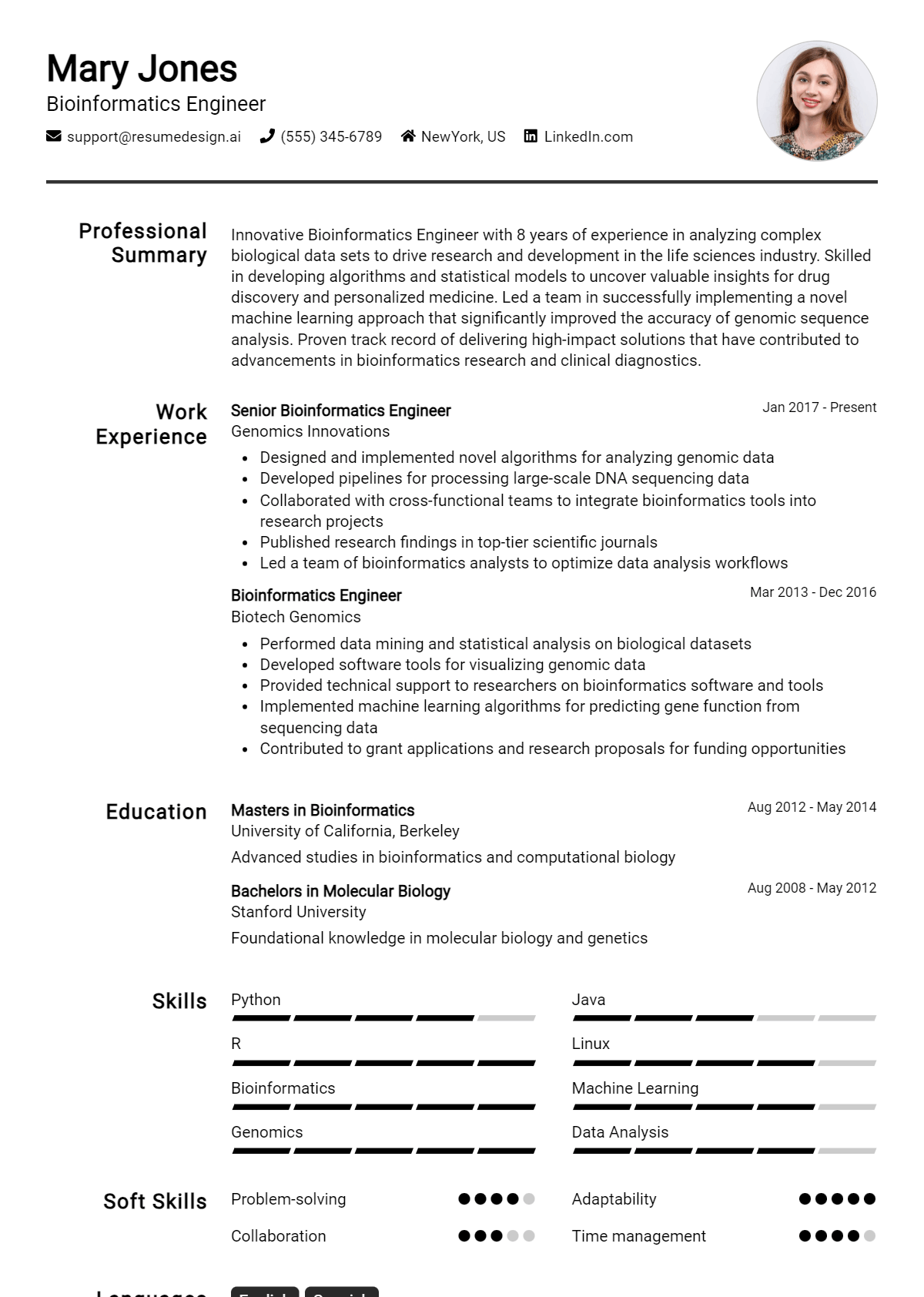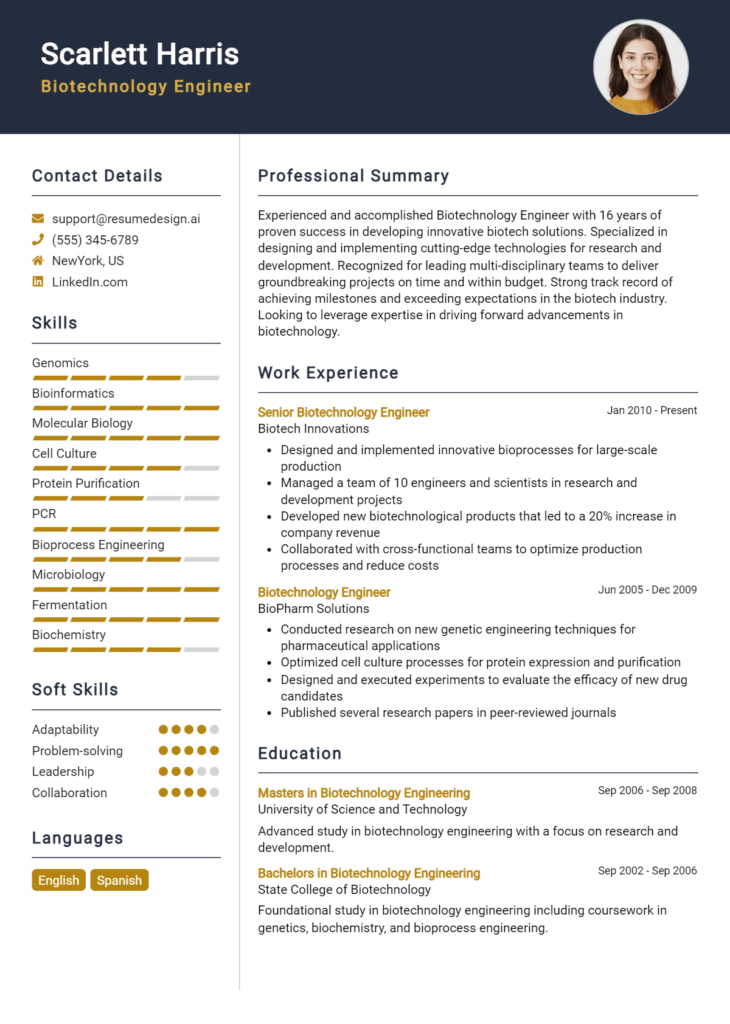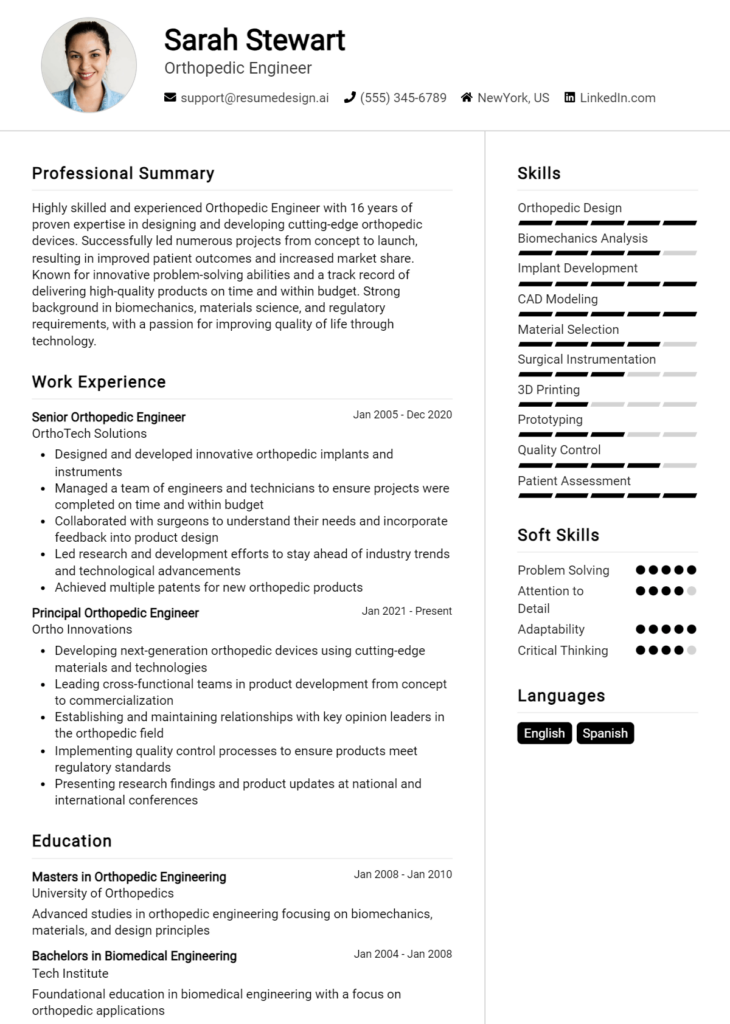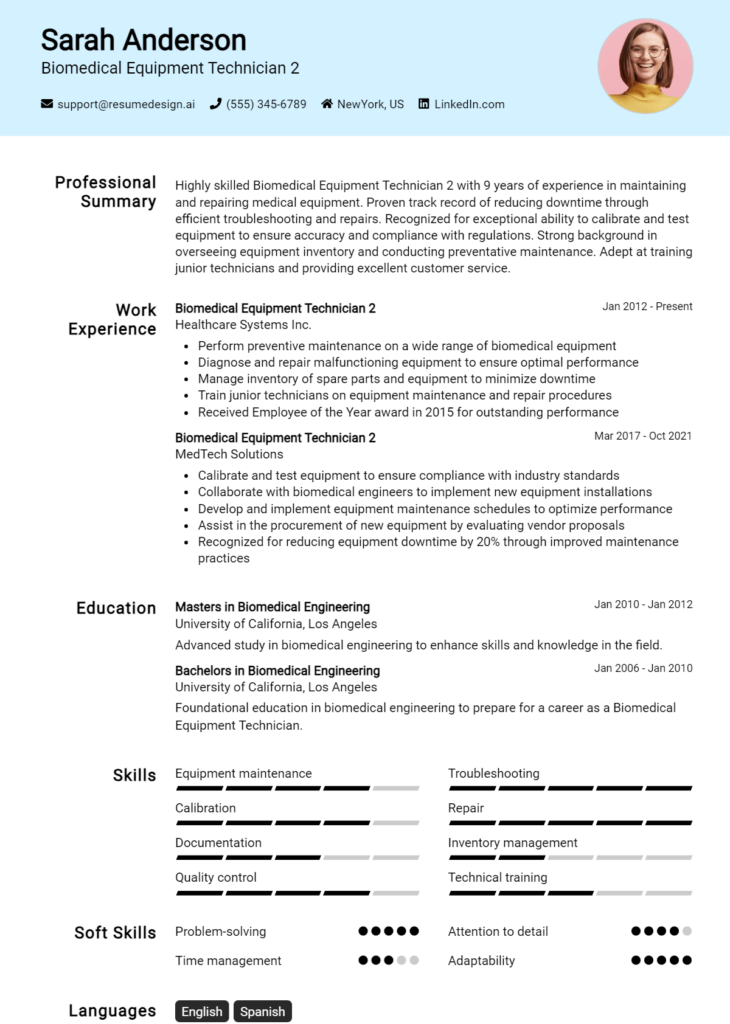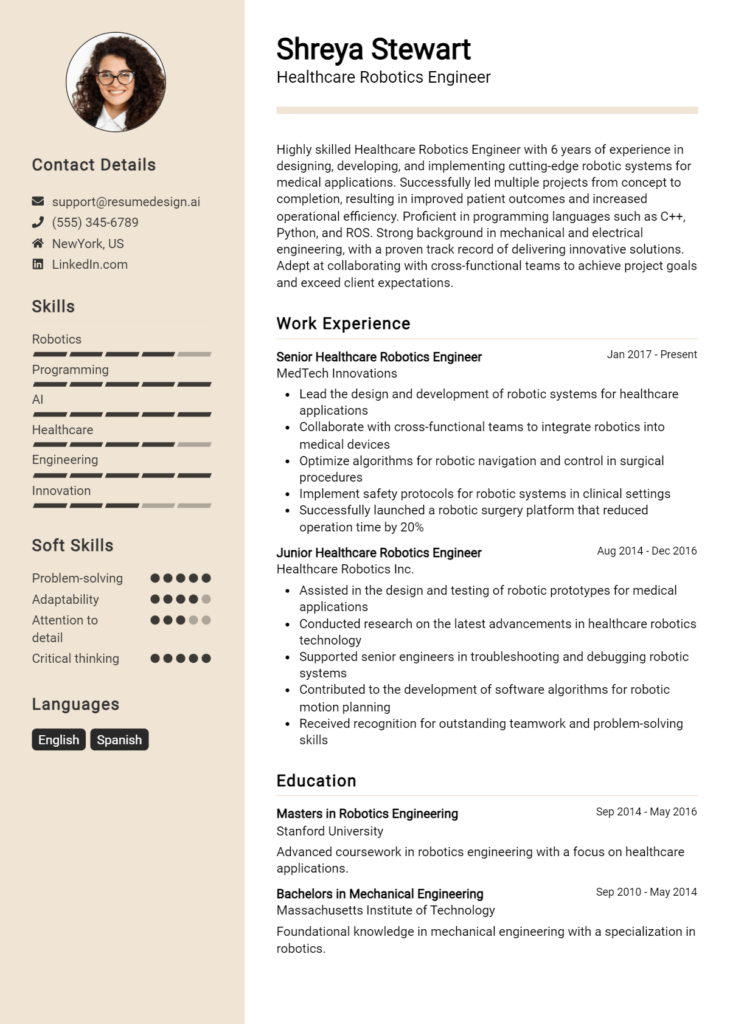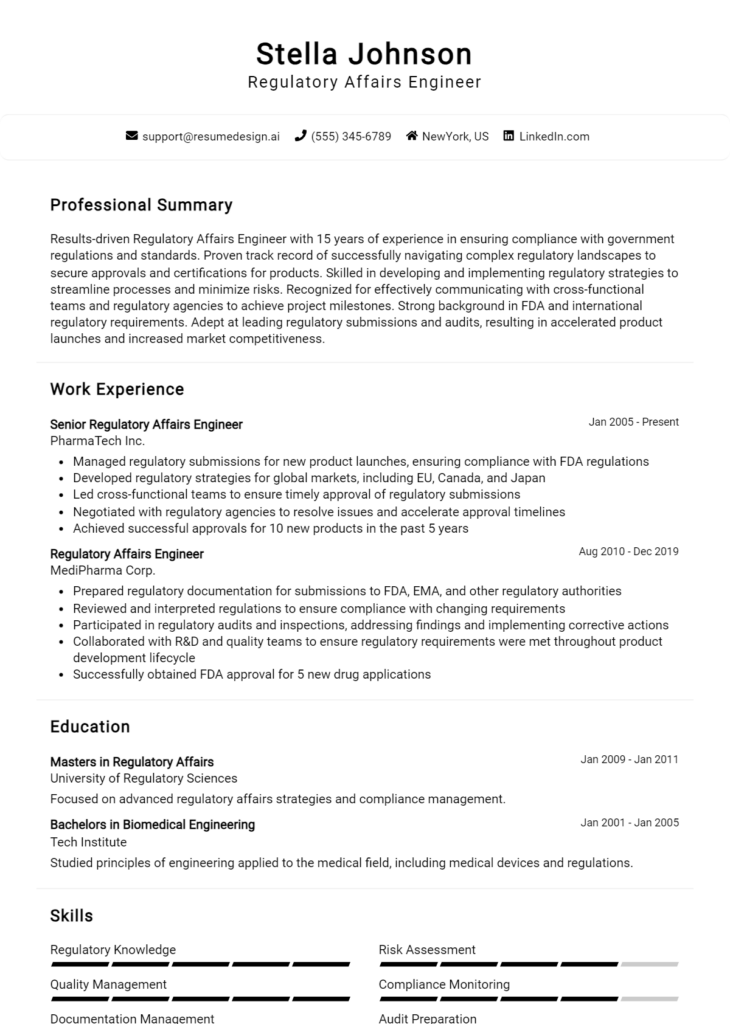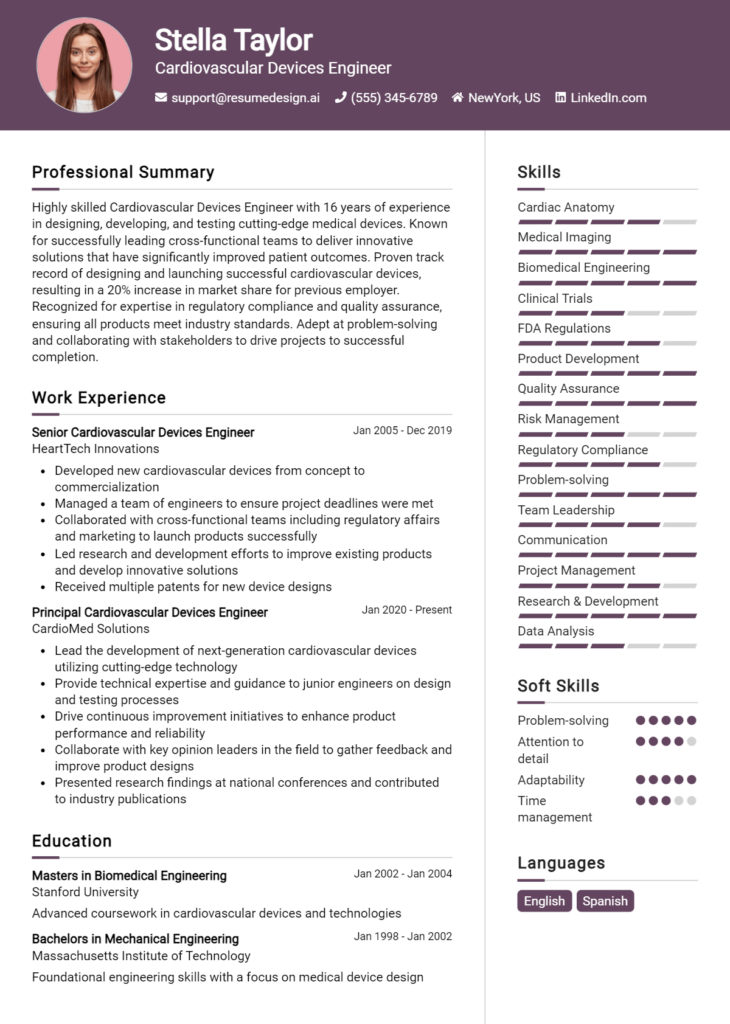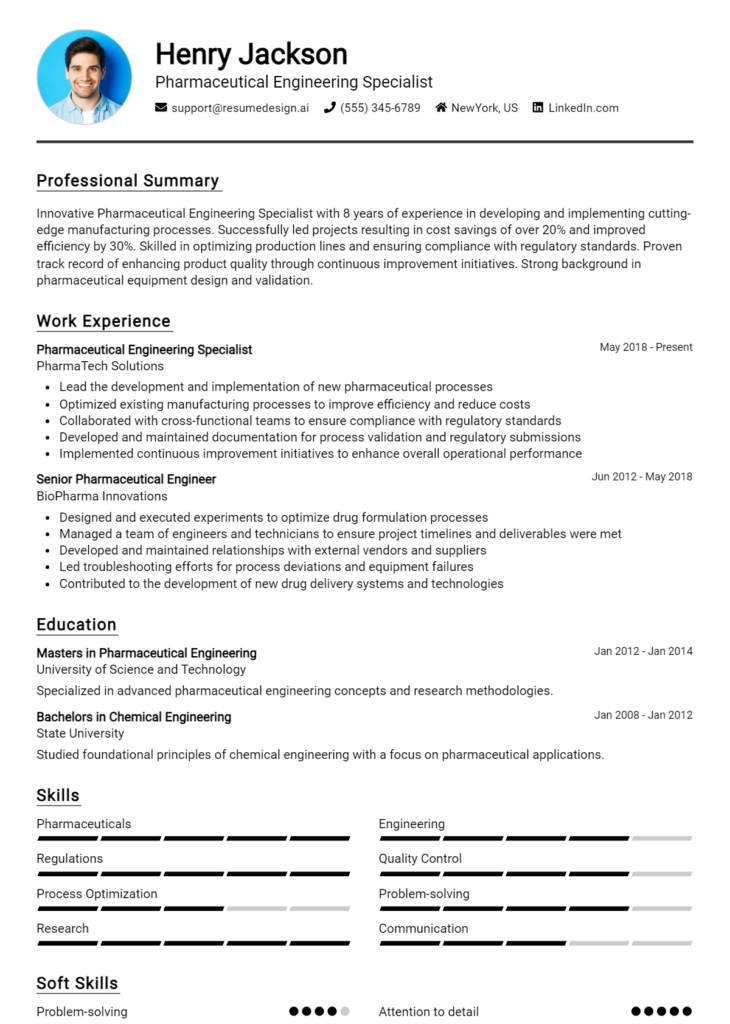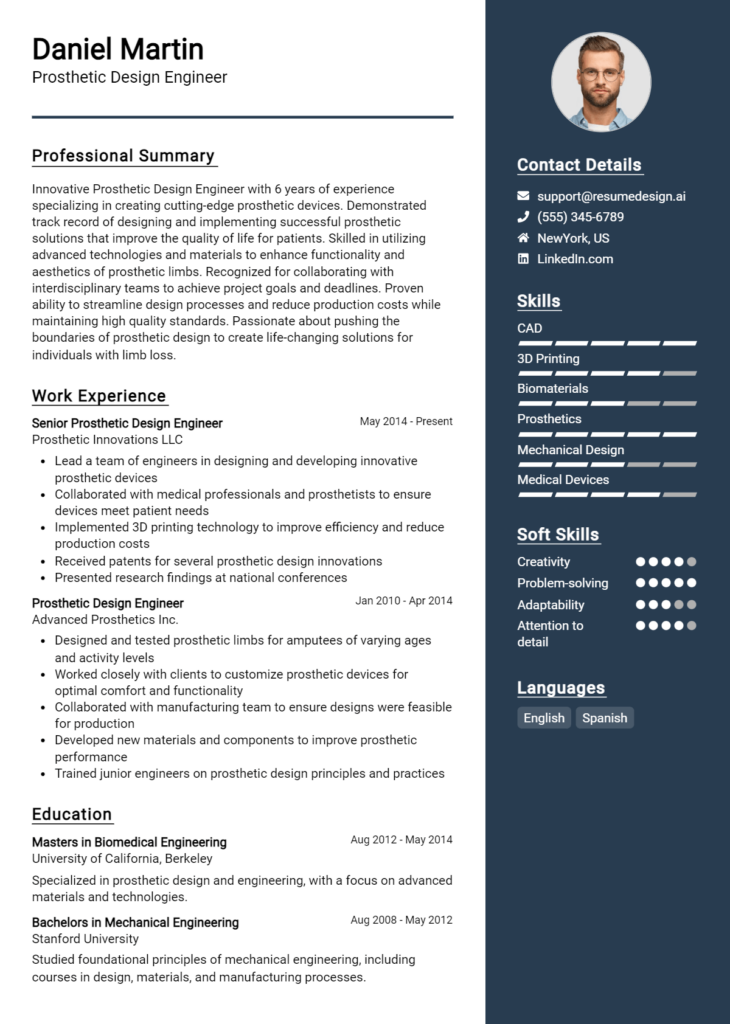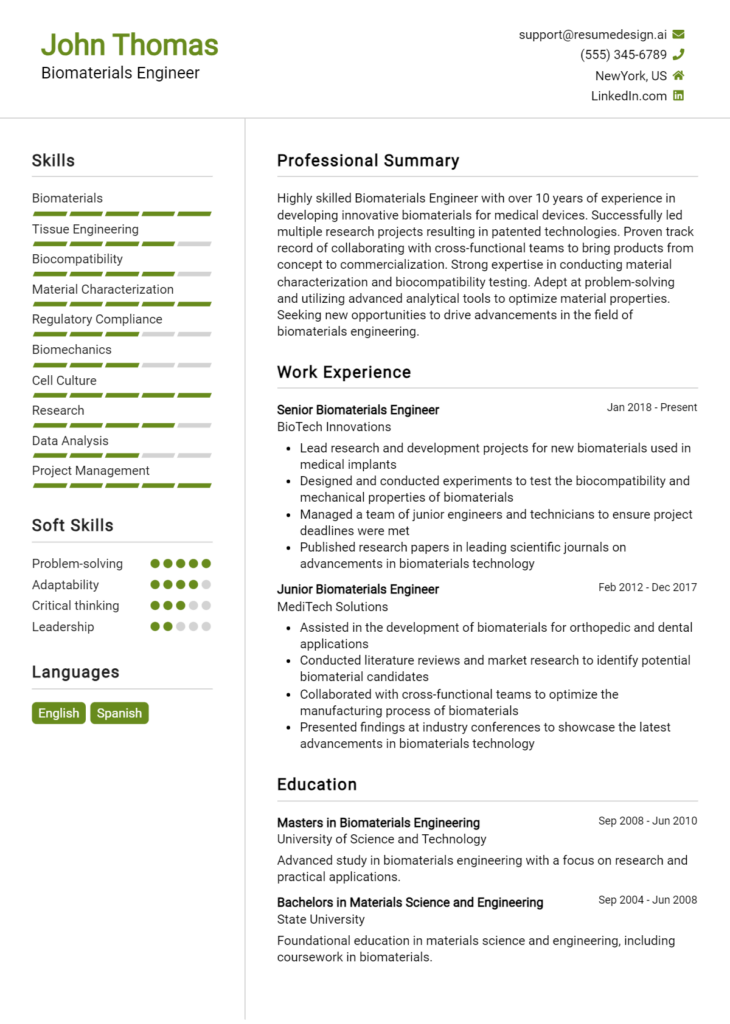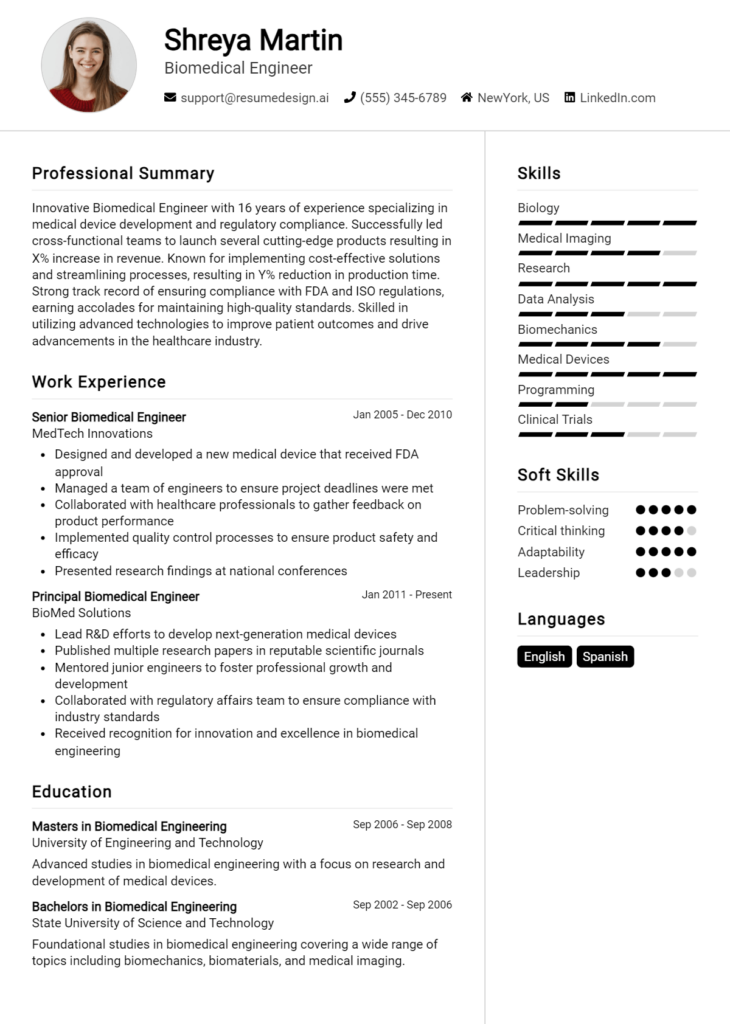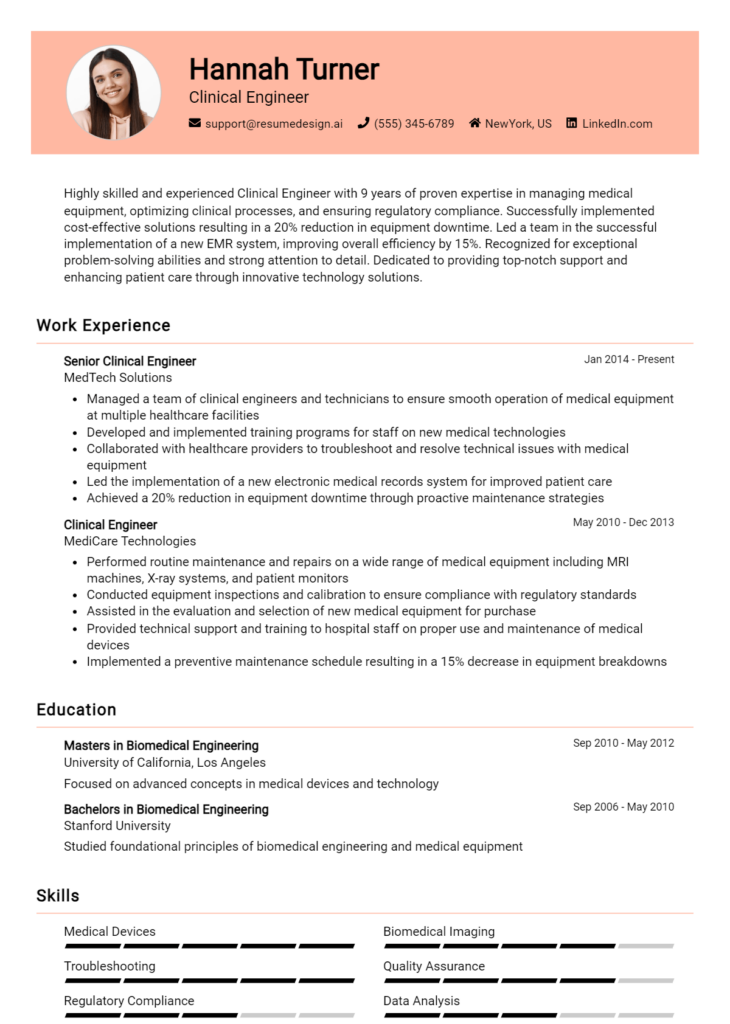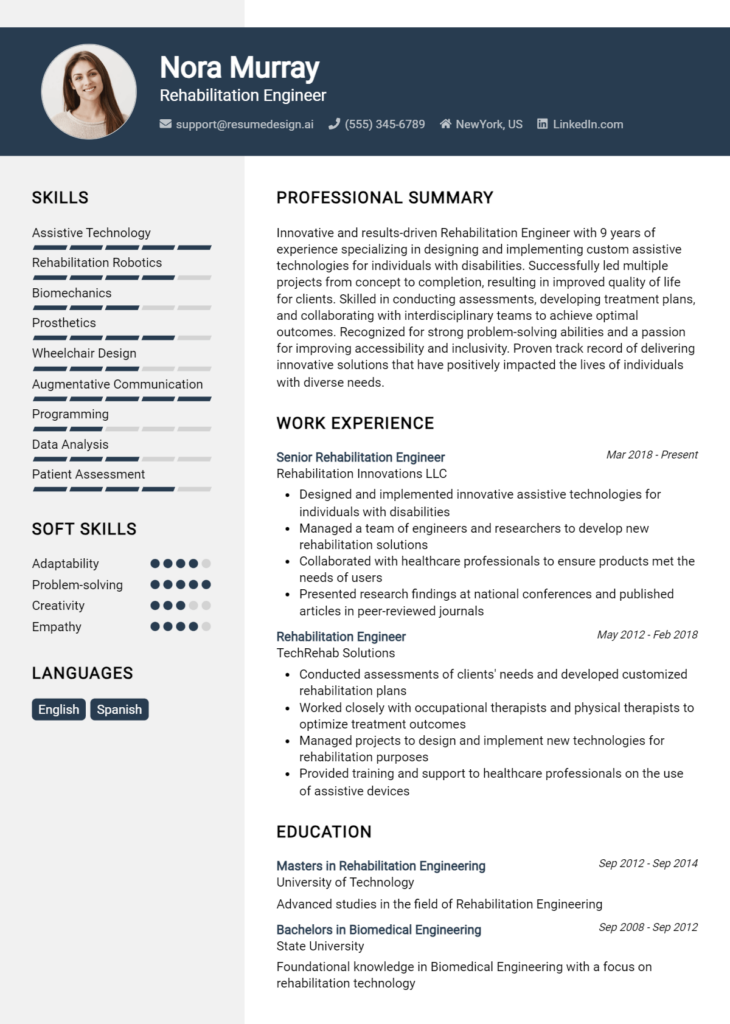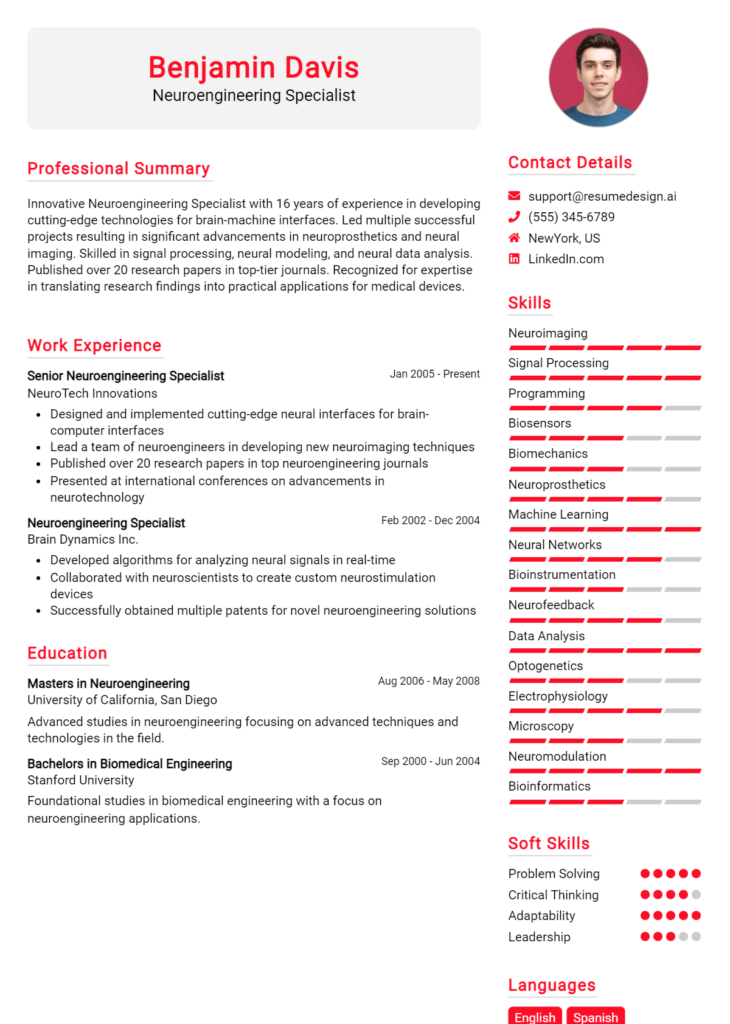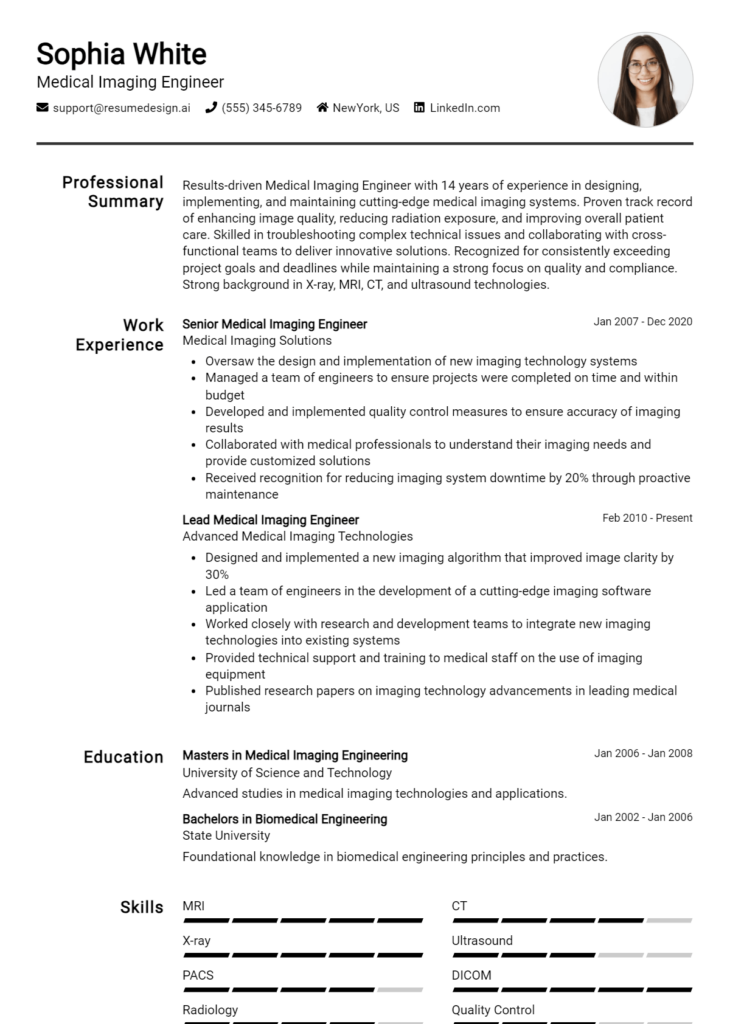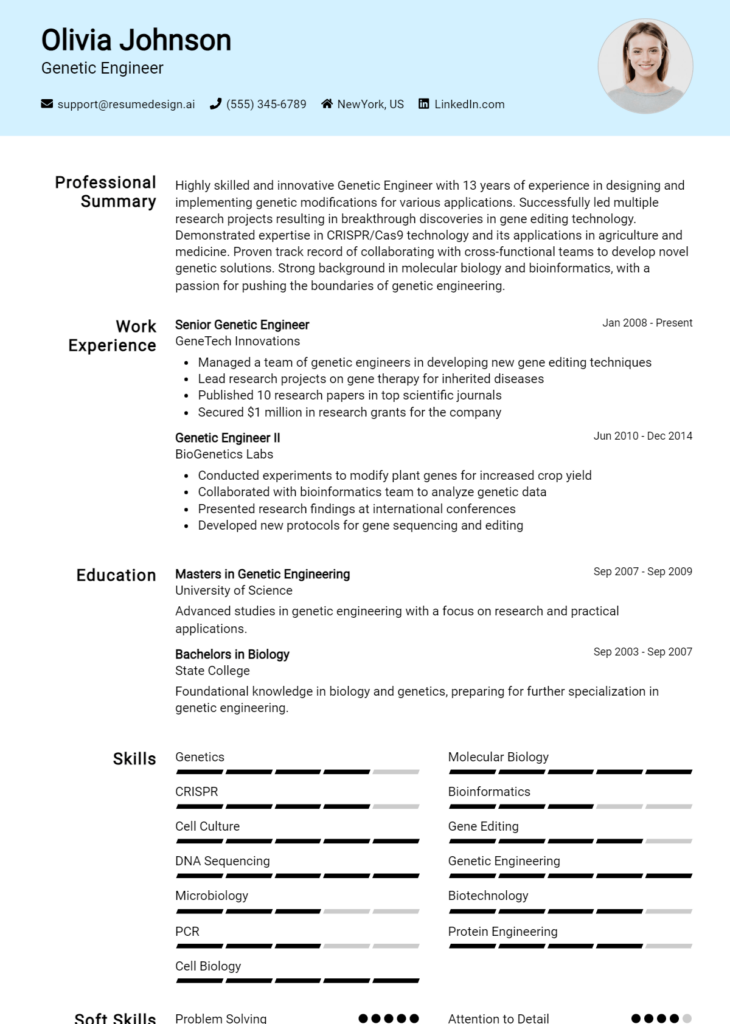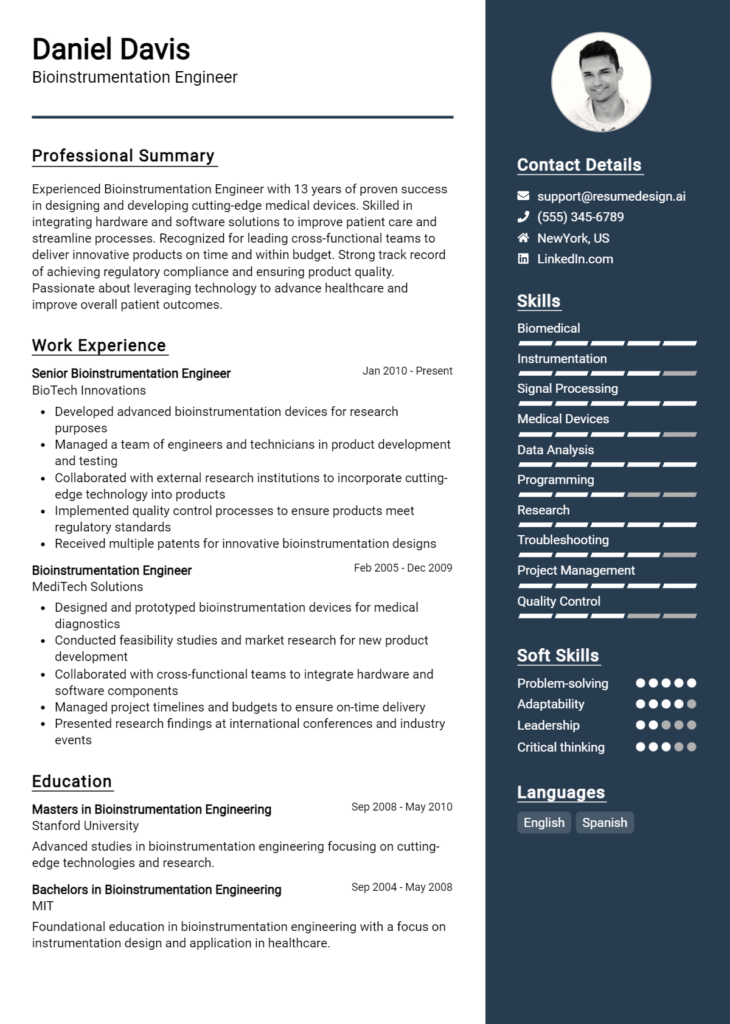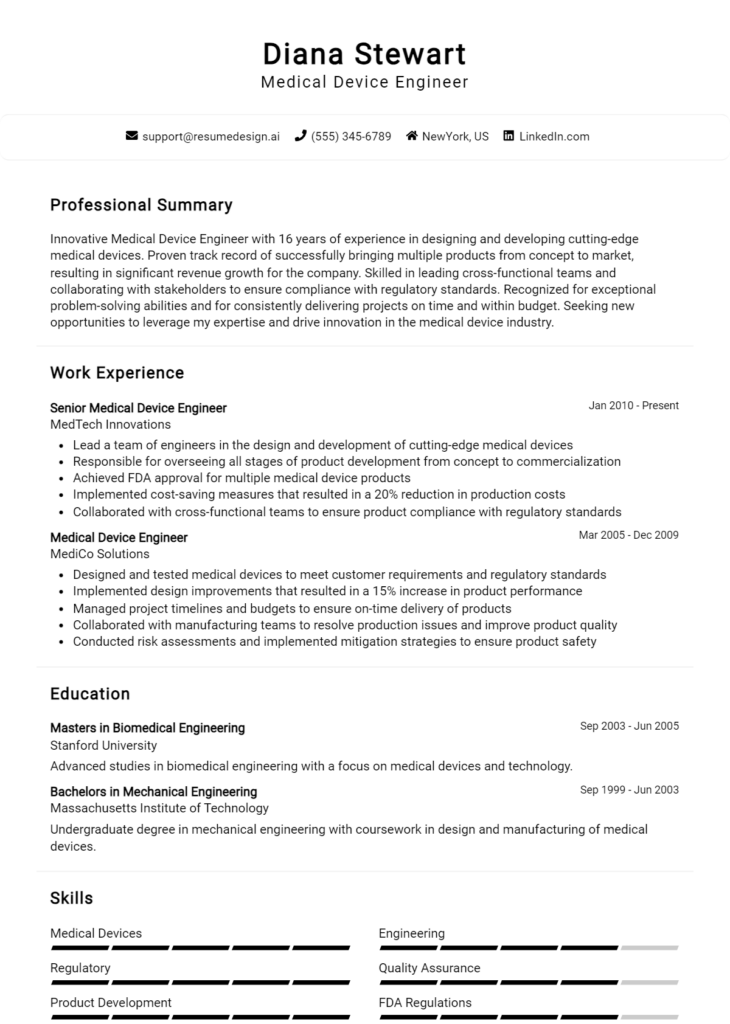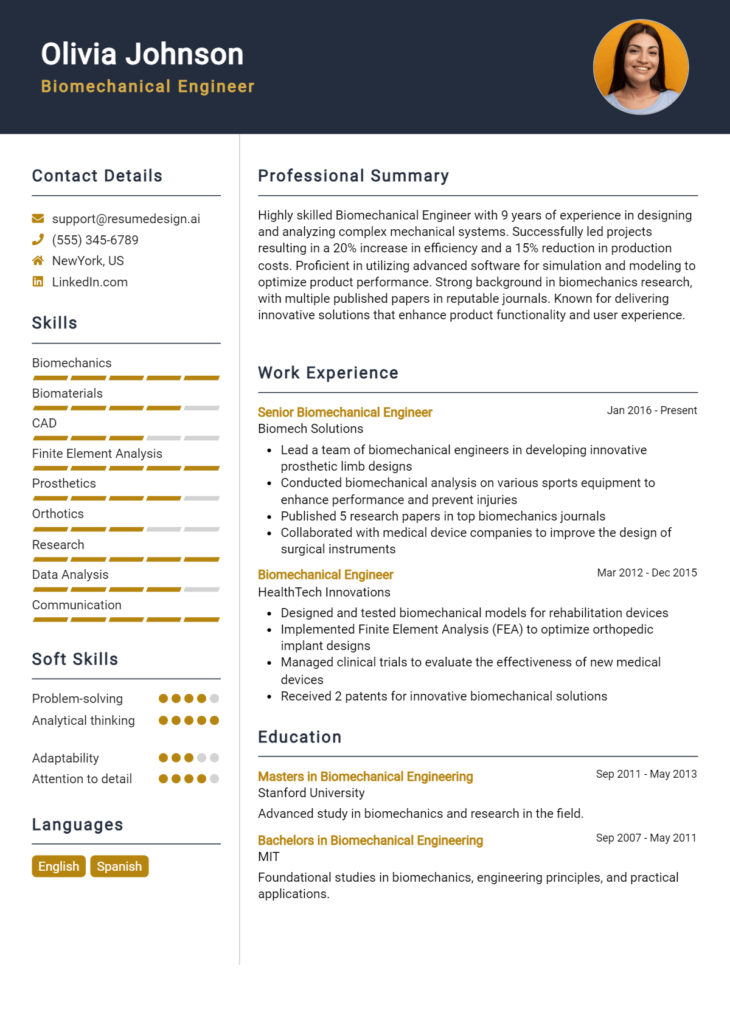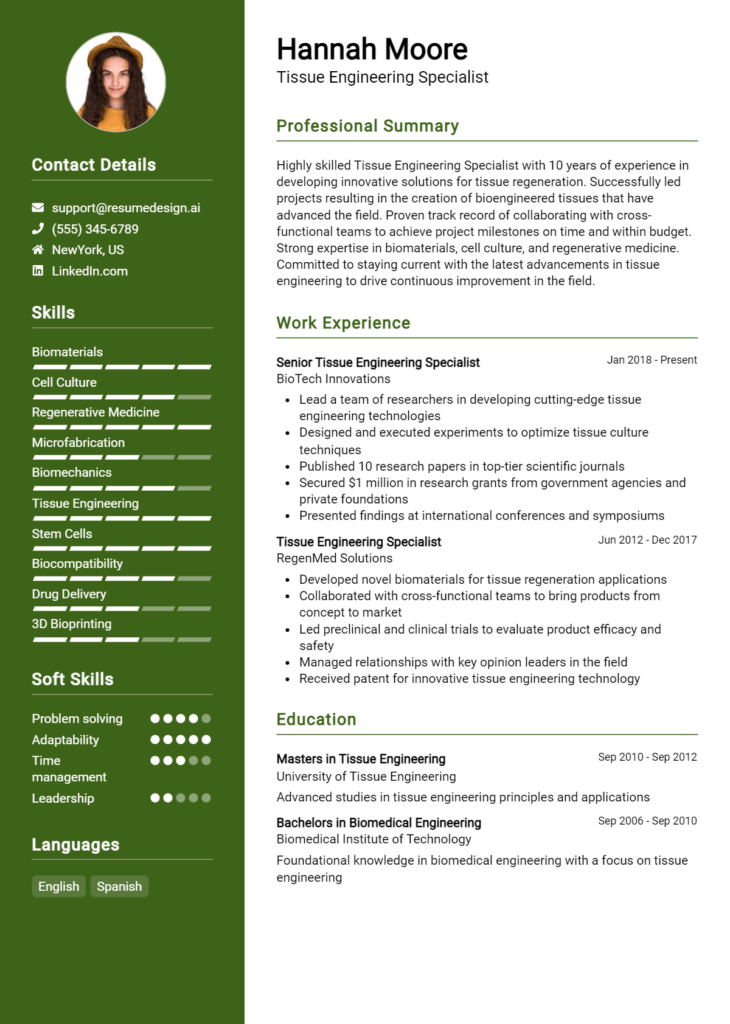Bioinformatics Engineer Core Responsibilities
A Bioinformatics Engineer plays a crucial role in integrating biological data with computational techniques to advance research and development in life sciences. Key responsibilities include developing algorithms, analyzing genomic data, and collaborating with biologists, chemists, and IT professionals. Essential skills encompass technical proficiency in programming languages, operational understanding of data management systems, and strong problem-solving abilities. By effectively showcasing these qualifications on a well-structured resume, candidates can significantly contribute to the organization’s goals and innovation in the field.
Common Responsibilities Listed on Bioinformatics Engineer Resume
- Develop and maintain bioinformatics software tools and applications.
- Analyze and interpret complex biological data sets.
- Collaborate with interdisciplinary teams to design research projects.
- Implement statistical models for genomic data analysis.
- Maintain databases for biological information and tools.
- Conduct quality control and assurance on bioinformatics analyses.
- Provide technical support and training to research staff.
- Stay updated on advancements in bioinformatics and computational biology.
- Publish findings in scientific journals and present at conferences.
- Assist in grant writing and project proposals.
High-Level Resume Tips for Bioinformatics Engineer Professionals
In the competitive field of bioinformatics, a well-crafted resume is crucial for standing out among a sea of talented candidates. It serves as the first impression a potential employer has of you, making it essential that it effectively showcases your skills, achievements, and unique qualifications. A strong resume not only highlights your technical expertise but also communicates your passion for the field and your ability to contribute to innovative projects. This guide will provide practical and actionable resume tips specifically tailored for Bioinformatics Engineer professionals, helping you create a document that truly reflects your potential.
Top Resume Tips for Bioinformatics Engineer Professionals
- Tailor your resume to match the job description by incorporating relevant keywords and phrases.
- Highlight your technical skills, such as proficiency in programming languages (e.g., Python, R) and data analysis tools (e.g., Bioconductor, Galaxy).
- Showcase relevant experience by detailing specific projects or roles that demonstrate your expertise in bioinformatics.
- Quantify your achievements, using metrics where possible (e.g., improved analysis speed by 30%, processed 1 million genomic sequences).
- Include publications, presentations, or contributions to scientific research that can set you apart as a knowledgeable candidate.
- Emphasize collaboration and teamwork experiences, essential in interdisciplinary environments like bioinformatics.
- Utilize a clear and professional format, ensuring your resume is easy to read and visually appealing.
- Incorporate certifications or relevant coursework to demonstrate ongoing learning and commitment to the field.
- Keep your resume concise, ideally one page, focusing on the most relevant information for the position.
By implementing these tips, you can significantly increase your chances of landing a job in the bioinformatics engineering field. A well-structured resume that effectively communicates your skills and achievements not only captures the attention of hiring managers but also positions you as a strong candidate ready to contribute to cutting-edge research and technology.
Why Resume Headlines & Titles are Important for Bioinformatics Engineer
In the competitive field of bioinformatics, where technical expertise meets biological research, the importance of a well-crafted resume headline or title cannot be overstated. A strong headline serves as the first impression for hiring managers, offering a succinct summary of a candidate's key qualifications and expertise. By encapsulating essential skills and experiences in one impactful phrase, a compelling title can immediately capture attention and differentiate a candidate from others. It is crucial that the headline is concise, relevant, and directly aligned with the job being pursued, effectively setting the stage for the rest of the resume.
Best Practices for Crafting Resume Headlines for Bioinformatics Engineer
- Be concise: Aim for a headline that is brief and to the point, ideally no more than a single sentence.
- Use role-specific keywords: Incorporate terminology and phrases relevant to bioinformatics to align with industry standards.
- Highlight key skills or experiences: Focus on the most relevant qualifications that make you a strong candidate.
- Tailor for each application: Customize your headline for each position to reflect the specific requirements of the job.
- Include measurable achievements: Where possible, mention accomplishments that quantify your contributions in previous roles.
- Stay professional: Maintain a formal tone that reflects the seriousness of the position you are applying for.
- Avoid jargon: Ensure that your headline is understandable and accessible to a broad audience, including HR professionals.
- Make it impactful: Use strong action words to convey confidence and capability in your field.
Example Resume Headlines for Bioinformatics Engineer
Strong Resume Headlines
"Innovative Bioinformatics Engineer with 5+ Years of Experience in Genomic Data Analysis"
“Results-Driven Bioinformatics Specialist Skilled in Machine Learning and Data Mining Techniques”
“Dedicated Bioinformatics Engineer with Proven Track Record in Developing Next-Gen Sequencing Pipelines”
Weak Resume Headlines
“Bioinformatics Engineer Looking for Opportunities”
“Experienced Professional in Science and Technology”
The strong headlines are effective because they clearly convey specific skills, experiences, and accomplishments relevant to the bioinformatics field, making them compelling to hiring managers. They use impactful language and provide insight into the candidate's unique qualifications. In contrast, the weak headlines fail to impress because they are vague and generic, lacking any concrete information that would help a hiring manager understand what the candidate offers. Such titles do not stand out and miss the opportunity to create a strong first impression.
Work Experience Section for Bioinformatics Engineer Resume
The work experience section is a critical component of a Bioinformatics Engineer's resume, serving as a platform to demonstrate not only the candidate's technical prowess but also their leadership capabilities and commitment to delivering high-quality results. This section provides potential employers with insight into how the candidate has applied their knowledge in practical settings, managed teams, and contributed to successful project outcomes. By quantifying achievements and aligning experiences with industry standards, candidates can effectively showcase their value and relevance to prospective employers.
Best Practices for Bioinformatics Engineer Work Experience
- Clearly articulate technical skills relevant to bioinformatics, such as programming languages, data analysis tools, and bioinformatics software.
- Quantify achievements with specific metrics, such as the percentage of error reduction or time saved in project completion.
- Highlight experiences that demonstrate leadership or team management abilities, illustrating how you positively influenced team dynamics and outcomes.
- Include collaborative projects with interdisciplinary teams, showcasing your ability to work effectively across various scientific and engineering domains.
- Tailor your experience descriptions to align with the job requirements, using industry-specific terminology and focusing on relevant projects.
- Showcase ongoing professional development, such as certifications, workshops, or training that enhance your bioinformatics expertise.
- Use action verbs to start bullet points, making your contributions clear and impactful.
- Maintain a clear and concise format, making it easy for hiring managers to read and extract key information quickly.
Example Work Experiences for Bioinformatics Engineer
Strong Experiences
- Led a team of 5 bioinformaticians to develop a novel algorithm that increased genomic data processing efficiency by 30%, significantly reducing analysis time.
- Oversaw the implementation of a cloud-based data management system that improved data accessibility for research teams, resulting in a 25% increase in collaborative project outputs.
- Developed and validated a machine learning model for predicting protein interactions, achieving an accuracy rate of 92%, which was published in a peer-reviewed journal.
- Collaborated with clinical researchers to integrate bioinformatics tools into patient data analysis workflows, enhancing diagnostic capabilities and improving patient outcomes by 15%.
Weak Experiences
- Worked on various bioinformatics projects without specific details on contributions or outcomes.
- Participated in team meetings and discussions regarding bioinformatics tools.
- Assisted in data analysis tasks with minimal description of the techniques or tools used.
- Involved in projects that were not directly related to bioinformatics but required some technical skills.
The strong experiences are considered effective because they provide clear, quantifiable outcomes and demonstrate leadership, technical expertise, and collaboration, making them compelling to potential employers. In contrast, the weak experiences lack specificity and measurable achievements, failing to communicate the candidate's true impact or relevance in the field, which can significantly diminish their attractiveness to hiring managers.
Education and Certifications Section for Bioinformatics Engineer Resume
The education and certifications section of a Bioinformatics Engineer resume is crucial in establishing the candidate's foundational knowledge and expertise in this interdisciplinary field. It effectively showcases the academic background, relevant coursework, and any industry-recognized certifications that reflect a commitment to continuous learning and professional development. By including this section, candidates can enhance their credibility and demonstrate alignment with the specific requirements of the job role, making a strong case for their suitability as a Bioinformatics Engineer.
Best Practices for Bioinformatics Engineer Education and Certifications
- Prioritize relevant degrees, such as a Master's or Ph.D. in Bioinformatics, Computational Biology, or related fields.
- Highlight industry-recognized certifications like Certified Bioinformatics Professional (CBP) or Bioinformatics Data Scientist.
- Include relevant coursework that demonstrates proficiency in key areas such as genomics, data analysis, and programming languages.
- Detail any specialized training in bioinformatics software or tools, such as R, Python, or Bioconductor.
- Use clear and concise language to describe educational qualifications and be specific about the institutions attended.
- Regularly update this section to include new certifications or training that reflect the latest advancements in the field.
- Consider adding any honors or awards received during academic pursuits to further bolster credibility.
- Ensure the layout is clean and easy to read, allowing employers to quickly assess qualifications.
Example Education and Certifications for Bioinformatics Engineer
Strong Examples
- M.S. in Bioinformatics, Stanford University, 2022
- Certified Bioinformatics Professional (CBP), 2021
- Relevant Coursework: Genomic Data Analysis, Machine Learning for Biological Data, Programming in Python
- Specialized Training: Advanced R for Bioinformatics, Johns Hopkins University, 2023
Weak Examples
- Bachelor's Degree in Philosophy, University of XYZ, 2010
- Certification in Basic Excel, 2020
- Relevant Coursework: Introduction to Psychology, 2015
- Online Course in Social Media Marketing, 2019
The strong examples are considered effective because they directly relate to the skills and knowledge required for a Bioinformatics Engineer, showcasing specialized training and advanced degrees that align with industry standards. In contrast, the weak examples lack relevance to the field of bioinformatics, highlighting degrees and certifications that do not contribute to the candidate's qualifications in this technical domain.
Top Skills & Keywords for Bioinformatics Engineer Resume
In the rapidly evolving field of bioinformatics, having the right skills is crucial for success. A well-crafted resume for a Bioinformatics Engineer not only highlights technical expertise but also showcases essential soft skills that enable effective collaboration and problem-solving. Employers look for candidates who can navigate complex bioinformatics tools and databases while also possessing the interpersonal skills necessary for teamwork and communication. By incorporating a comprehensive list of both hard and soft skills, candidates can present themselves as well-rounded professionals ready to tackle the challenges of this interdisciplinary field.
Top Hard & Soft Skills for Bioinformatics Engineer
Soft Skills
- Strong analytical thinking
- Effective communication
- Team collaboration
- Problem-solving abilities
- Attention to detail
- Adaptability and flexibility
- Time management
- Critical thinking
- Project management
- Creativity in research approaches
- Leadership potential
- Ability to work under pressure
- Strong interpersonal skills
- Initiative and self-motivation
- Ethical judgment and decision-making
Hard Skills
- Proficiency in programming languages (Python, R, Java)
- Experience with bioinformatics tools (BLAST, Bioconductor)
- Knowledge of genomics and transcriptomics
- Familiarity with databases (NCBI, Ensembl)
- Statistical analysis and data interpretation
- Experience with data visualization tools (Tableau, ggplot)
- Understanding of molecular biology concepts
- Mastery of software development lifecycle
- Skills in machine learning and AI applications in bioinformatics
- Familiarity with cloud computing platforms (AWS, Google Cloud)
- Proficient in using version control systems (Git)
- Experience with high-throughput sequencing technologies
- Knowledge of systems biology and computational modeling
- Understanding of biological pathways and networks
- Expertise in data mining and big data analysis
- Familiarity with laboratory techniques and protocols
- Skills in algorithm development for biological data analysis
Incorporating these skills into your resume can significantly enhance your chances of landing a position as a Bioinformatics Engineer. Additionally, showcasing relevant work experience will further demonstrate your qualifications and readiness to contribute to potential employers.
Stand Out with a Winning Bioinformatics Engineer Cover Letter
Dear Hiring Manager,
I am writing to express my interest in the Bioinformatics Engineer position at [Company Name], as advertised on [Job Board/Website]. With a robust background in computational biology and a passion for leveraging data to drive biological insights, I am excited about the opportunity to contribute to your team. My experience in developing and implementing bioinformatics tools, along with my strong programming skills in languages such as Python and R, make me a suitable candidate for this role.
During my previous role at [Previous Company Name], I successfully designed and optimized algorithms for genomic data analysis, which resulted in a 30% increase in processing efficiency. My collaborative work with interdisciplinary teams allowed us to effectively translate biological questions into computational solutions. Furthermore, I have hands-on experience with various bioinformatics software and databases, including BLAST, Bioconductor, and Ensembl, which I utilized to support research initiatives in genomics and proteomics.
I am particularly drawn to the innovative projects at [Company Name] and the potential to work alongside leading scientists in the field. I am eager to bring my expertise in data analysis, pipeline development, and machine learning applications to your organization. I am confident that my proactive approach and ability to communicate complex ideas clearly will enhance the collaborative efforts within your research teams.
Thank you for considering my application. I look forward to the opportunity to discuss how my skills and experiences align with the goals of [Company Name]. I am excited about the possibility of contributing to your groundbreaking research and helping to advance the field of bioinformatics.
Sincerely,
[Your Name]
[Your Phone Number]
[Your Email Address]
Common Mistakes to Avoid in a Bioinformatics Engineer Resume
A well-crafted resume is essential for a Bioinformatics Engineer, as it serves as a first impression to potential employers in a competitive field. However, many candidates make common mistakes that can hinder their chances of landing an interview. By avoiding these pitfalls, you can ensure that your resume highlights your skills and experience effectively, showcasing your suitability for the role. Here are some common mistakes to watch out for:
Generic Objective Statement: Using a vague or generic objective statement fails to convey your specific career goals or how you can contribute to the company. Tailor your objective to reflect your unique aspirations and the value you bring.
Ignoring Keywords: Many employers use Applicant Tracking Systems (ATS) to filter resumes. Failing to include relevant keywords from the job description can result in your resume being overlooked, even if you are qualified.
Overloading with Technical Jargon: While technical skills are crucial, using excessive jargon can alienate non-technical hiring managers. Strike a balance by clearly explaining your skills and experiences without overwhelming the reader.
Not Showcasing Relevant Experience: Omitting or underemphasizing relevant experience, such as internships or projects, can undercut your qualifications. Be sure to highlight experiences that directly relate to bioinformatics and the specific job you’re applying for.
Poor Formatting and Layout: A cluttered or unprofessional layout can distract from your content. Ensure your resume is well-organized, with clear headings and consistent formatting that enhances readability.
Focusing Only on Responsibilities: Simply listing job responsibilities does not convey the impact of your contributions. Instead, focus on achievements and quantifiable results to demonstrate your effectiveness in previous roles.
Neglecting Soft Skills: Technical skills are vital, but soft skills like communication, teamwork, and problem-solving are equally important in a collaborative field like bioinformatics. Be sure to include examples of how you’ve applied these skills in your work.
Inconsistent Dates and Information: Inaccurate or inconsistent information about your employment history can raise red flags for recruiters. Always double-check dates, job titles, and details for accuracy to maintain credibility.
By being mindful of these common mistakes, you can create a stronger resume that effectively showcases your qualifications and helps you stand out in the bioinformatics job market.
Conclusion
As we conclude our exploration of the Bioinformatics Engineer role, it's clear that this position is at the forefront of integrating biology with data science. Key responsibilities include analyzing complex biological data, developing algorithms for data analysis, and collaborating with researchers to advance our understanding of genomics and proteomics. The demand for skilled Bioinformatics Engineers is on the rise as the life sciences continue to evolve, making it a promising career path.
To capitalize on these opportunities, it's essential to present a standout resume that highlights your skills and experiences effectively. Take a moment to review and refine your Bioinformatics Engineer resume to ensure it reflects your qualifications and sets you apart from the competition.
To assist you in this process, consider utilizing the following resources:
- Explore resume templates that can provide a professional layout for your resume.
- Use the resume builder to create a customized resume tailored to your strengths.
- Check out resume examples for inspiration on how to structure your content.
- Don’t forget to craft an effective cover letter using cover letter templates to complement your resume.
Take the next step in your career by ensuring your application materials are polished and professional. Start today!

